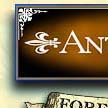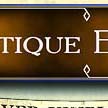Volunteer!
And Sell Your Old Books at a Premium
We get lots of mail from people who have old books they want to sell. As we say in our appraisal section, the vast majority of these books are nearly worthless.
That is ... unless your particular copy is the one scanned and forever visible by all on the Internet. Because we display books in full color scans, anybody can easily verify your book was the one scanned just by looking at the Internet copy and your copy of the actual book.
Our goal is to build a free library of really fun to read and interesting books. We need your help since we have other jobs to make a living. This website basically just makes enough money for the hosting. But we can host a lot.
So, here's the deal. If you have an old book, then scan it, and let us put it on this web site, forever. In return, we'll let you list your book for sale in our book sales area.
In trying to figure out what your scanned book is worth, you may note that
we generally value the book at its retail value, plus the effort to scan it at $25/hr. Scanning a book takes between two and ten hours.
We'll also let you be known as the benefactor that made this book available.
A book that may be worth $10 before scanning, might be worth $100 after scanning. However, we make no guarantees, and do not appraise book values.
Details on Scanning
PLEASE DO NOT ASK OUR PERMISSION TO SCAN AN OLD BOOK. IF YOU SCAN ONE ACCORDING TO THESE SIMPLE INSTRUCTIONS, WE WILL HAPPILY TAKE THE SCANS AND LIST YOUR BOOK OFFERING. WE DO RESERVE THE RIGHT TO TURN ANY OFFER DOWN FOR ANY REASON OR NO REASON.
This is the instruction on how to scan your book. First you must scan in full color (at least 256 colors) and provide your scans in JPEG format. JPEG is the usual color format used on the web. All scanners we know of will output JPEG (sometimes called JPG) files. Here are the rest of the rules:
- Page Scans. You must have only one or two (open book) pages per image.
You must be able to read everything on the page. Remember, our library is for people to read. We prefer you have one page per image.
The images must all be righted. In other words, the top left of the (left) page is the top left of the image.
- Page Scan File Names. The images should be numbered [optionalprefix][n][n]nnn.jpg, as in pr0033.jpg. Most scanning software will do this.
The numbers MUST be so that an alphabetical sort of the scan files will sort the pages in the right order. You can check this by doing a directory listing and arranging by name.
- Page Scan Resolution. Resolution must not be below 150 DPI (dots per inch) and not be more than 600 DPI (dots per inch). We want people to see all the detail on every page. Set the DPI once, and don't change it.
- JPEG Quality. You should save each page or two as JPEG with Maximum Quality (Contrary to popular belief, this is what is called "lossless" compression.)
If you save using the default settings with your scanner, that will be OK, but we prefer Maximum Quality (often the "10" setting).
If you make a mistake on this, that is OK.
- Optional OCR'ing. If you wish to have whole text search and you have a good quality OCR package (e.g., www.scansoft.com's Omnipage), then the OCR should be saved with the same name as the image but as ASCII Text with Carriage Returns (not Formatted!). So, for example, pr0033.jpg has a corresponding pr0033.txt file. It is ESSENTIAL that every .jpg scan file have a corresponding .txt OCR file, even if the file is empty! Again, all OCR packages we know of does this very readily.
Please note you do not have to OCR your book if you don't have the time, or don't even know or care what "OCR" is. ("OCR" stands for Optical Character Recognition). It just means we can provide full text search for the book. Our full text search mechanism is robust against 'OCR errors' so there is no need to correct the text unless you want to.
- When you have finished scanning. Contact us when you have scanned your book so we can have you upload your book scan and other information to our web site.
- Legal for Us. We require you sign all right and title to your scans and OCR to us, and to certify that you confirmed by inspection that the book is either
- out of copyright (the copy you scanned was printed in 1923 or before), or
- you own the copyright and have the right to let us own this scanned copy.
Yes, this means we cannot accept books printed after 1923 no matter how wonderful, unless you own the copyright or can otherwise demonstrate that the book is not copyrighted. Here is where you can find out more about copyright.
- Legal for You.
We grant you back the free right to use the scans and OCR you made, in perpetuity. This right for you, the volunteer, includes the right to put the scans up on the Internet yourself, or even to sell the scans to others for their use, as long as you convey our right of ownership, as in "This material is provided under license from www.antiquebooks.net".
- Legal on Listing for Sale. We will list your book for sale.
You provide the book description and contact information. The contact information is must be an ebay, ABEBook, or Amazon listing and we will make a live link to eBay, ABEbooks, or Amazon for the convenience of the purchaser. When your book listing on eBay, ABEbooks, or Amazon is gone for more than a month, we can remove your listing, although we won't remove your scanned book and the attribution to you as benefactor.
- If you are a bookseller.
Same deal. Except now you can up-sell some of your books and have the fun of scanning and enjoying the ones that you sell, even after you sold them.
- If you are a primitive tribesman.
Same deal again. For of you who believe that a picture of something steals the soul of that something, we are very sorry,
but it actually doesn't.
It just magnifies the soul and thereby the value.
If you don't have a color scanner
Color scanners that can do a fine job scanning books are very inexpensive. Retail you can buy them for under a hundred dollars, and on eBay, it is common to see them sell for one or two dollars.
There are commercial book scanners available for a couple of hundred dollars (so called Edge Scanners). There are more expensive book scanners (so called Planetary Scanners) that use a camera-like scanner on a copystand type of arrangement. Many highly precious books are preferably scanned on such specialized scanners, but, quite frankly, even a book worth a few hundred dollars can be easily scanned on a cheap color scanner or an inexpensive Edge scanner. A nice inexpensive Edge scanner is the OptiBook 3600 from www.plustek.com.
This book was scanned using the OptiBook 3600.
There also exist higher end book scanners that can range over a million dollars that automatically turn pages. Stanford University Library has one, but then that library isn't free to the people.
Forever Visible by All is a Registered Trademark of
Antique Books, Inc.
Contact Us
|













